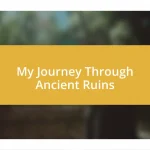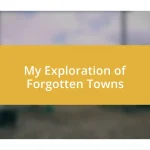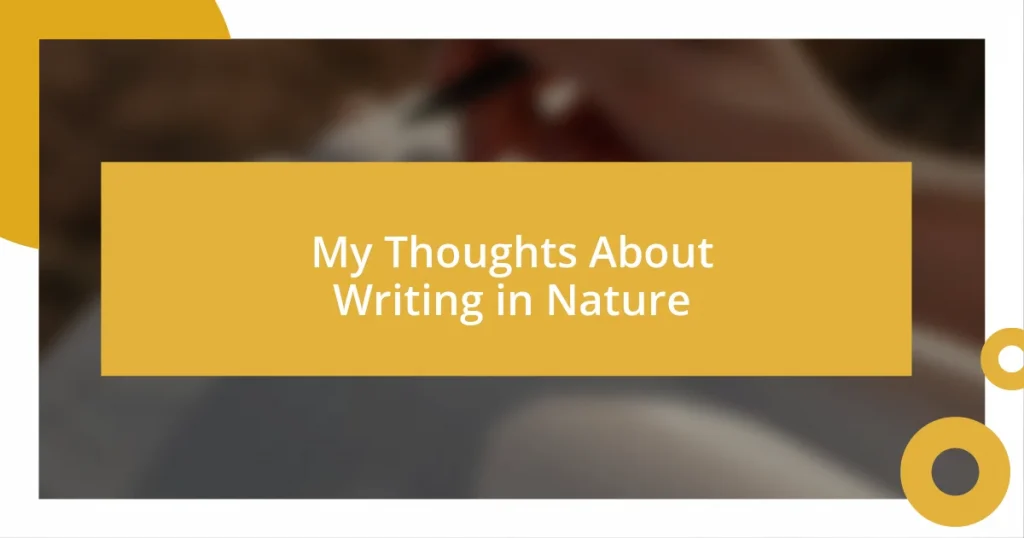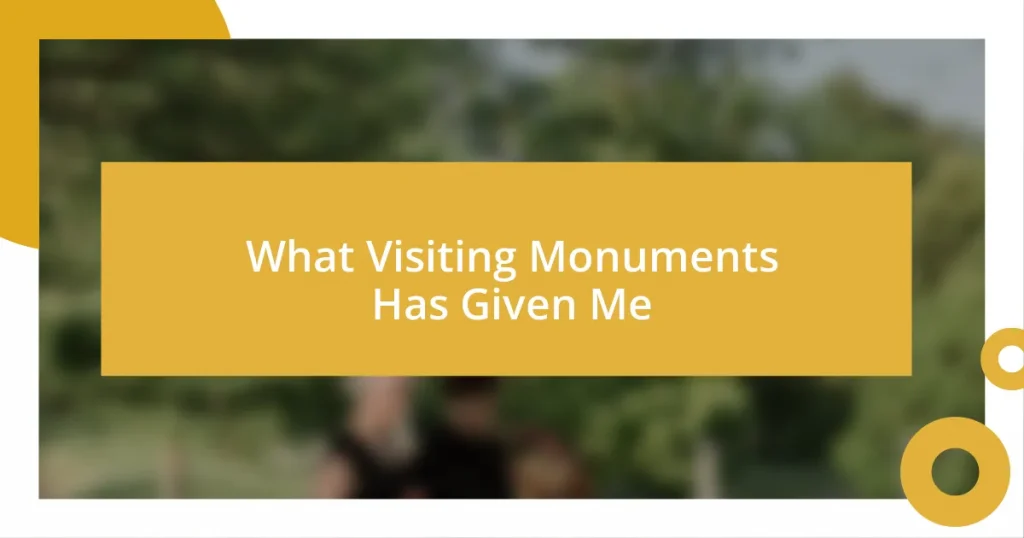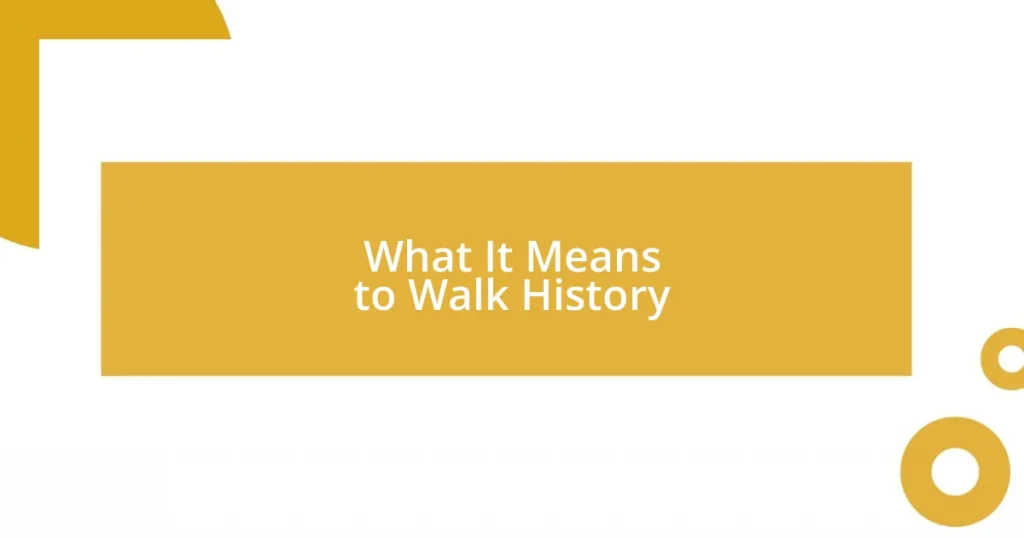Key takeaways:
- Writing in nature enhances clarity, creativity, and mindfulness, allowing ideas to flow more freely and authentically.
- Engaging the senses and finding the right outdoor space can significantly improve focus and inspire new perspectives during the writing process.
- Incorporating elements of nature, whether outdoors or indoors, fosters creativity and serves as a powerful muse for writing.
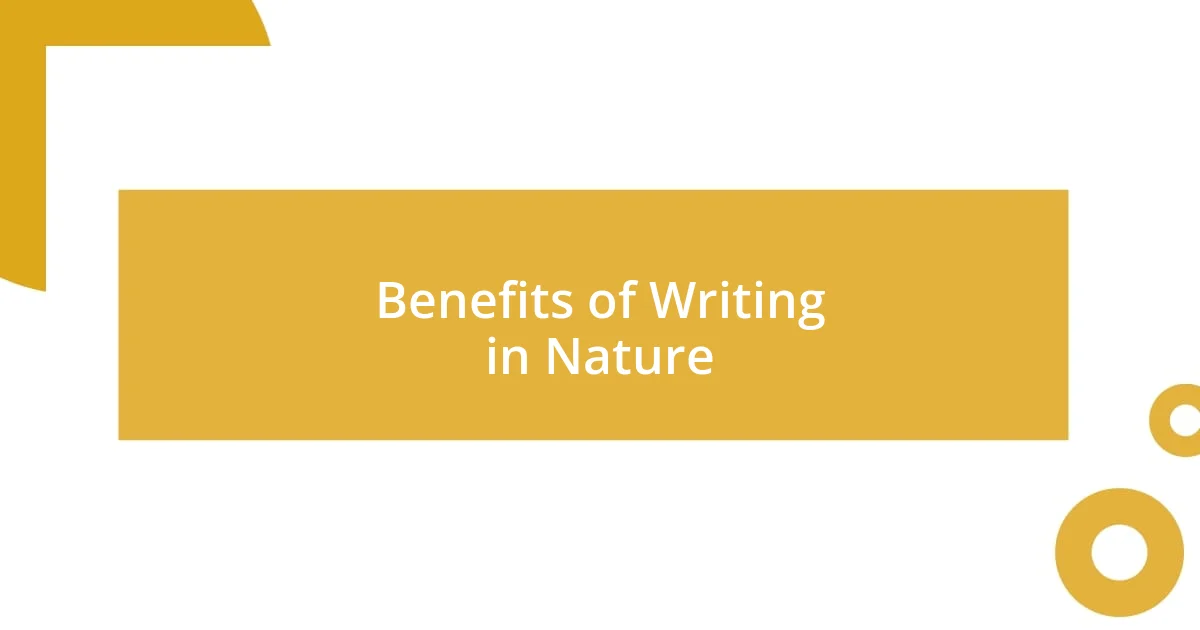
Benefits of Writing in Nature
One of the most profound benefits of writing in nature is the heightened sense of clarity it brings. I remember sitting by a gentle stream, the sound of water dancing around me, and how my thoughts flowed more freely. It felt almost magical—like the trees were whispering inspiration into my ears. Have you ever experienced that moment when the world around you suddenly makes your ideas bloom?
Being surrounded by nature also offers a unique calmness that enhances creativity. I often find that the rustling leaves and birdsong create an ambient soundscape, which helps me focus and let my thoughts wander in unexpected directions. Imagine trying to write in a bustling café versus the serene embrace of a quiet park; it’s like comparing night to day, don’t you think?
Furthermore, nature encourages mindfulness, making our writing more authentic. When I write outdoors, I’m more present, absorbing the beauty around me and allowing it to influence my words. It’s in those moments that my writing feels richer and more connected to my emotions. How does the environment impact your own creative process?
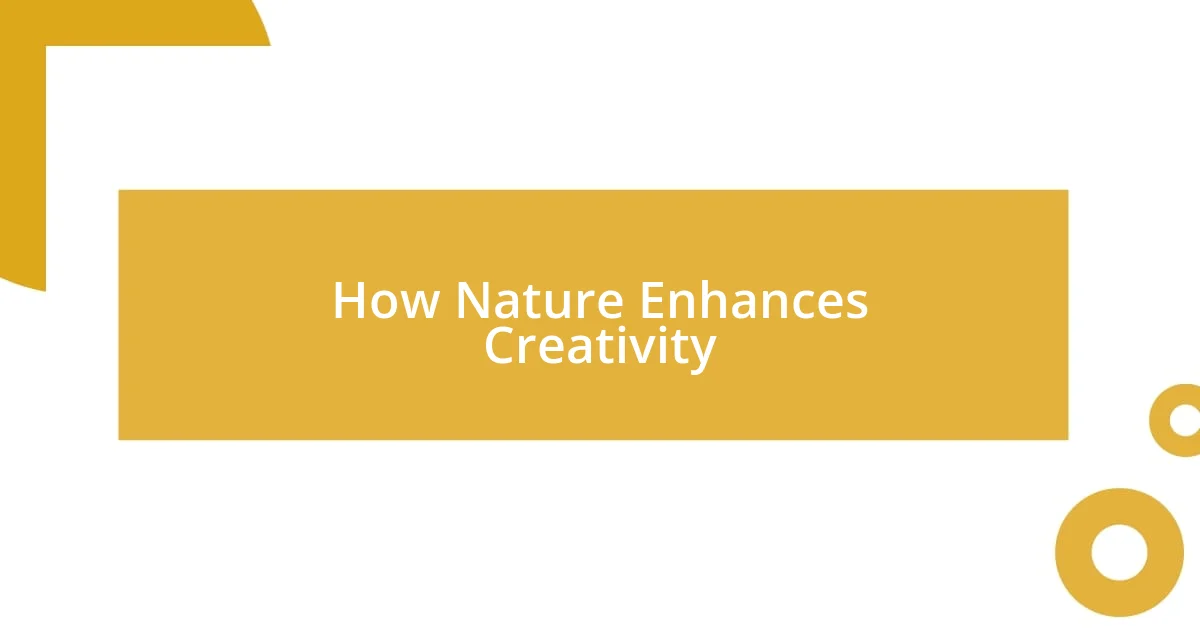
How Nature Enhances Creativity
One striking aspect I’ve noticed is how the natural light affects my mood and creativity. I often find that golden hour—just before sunset—puts me in a reflective state. Once, while jotting down ideas under a sprawling oak tree, I felt this flood of inspiration; the warm glow around me seemed to ignite my imagination. Have you ever noticed how certain moments in nature can just shift your entire perspective?
The diversity of nature is also incredibly stimulating for creative thinking. Take a walk on a nature trail, and you’ll come across everything from vibrant flowers to towering mountains. I vividly recall the diverse colors and forms of plants during a hike. Each twist and turn along the path provoked different thoughts and triggered memories. Nature’s variability constantly offers fresh insights, don’t you agree?
To me, the rhythm of nature provides a unique backdrop that fosters creativity. While sitting by a lake, I’ve been inspired by the gentle ripples and the way they reflect the sky. It feels like nature has its own heartbeat, pulling me into a creative flow. I often find the same ideas appear in different forms, much like nature itself—a reminder that creativity is a dynamic process.
| Aspect | Impact on Creativity |
|---|---|
| Natural Light | Enhances mood and inspires new ideas |
| Diversity of Nature | Stimulates fresh perspectives and memories |
| Rhythm of Nature | Encourages a fluid creative process |
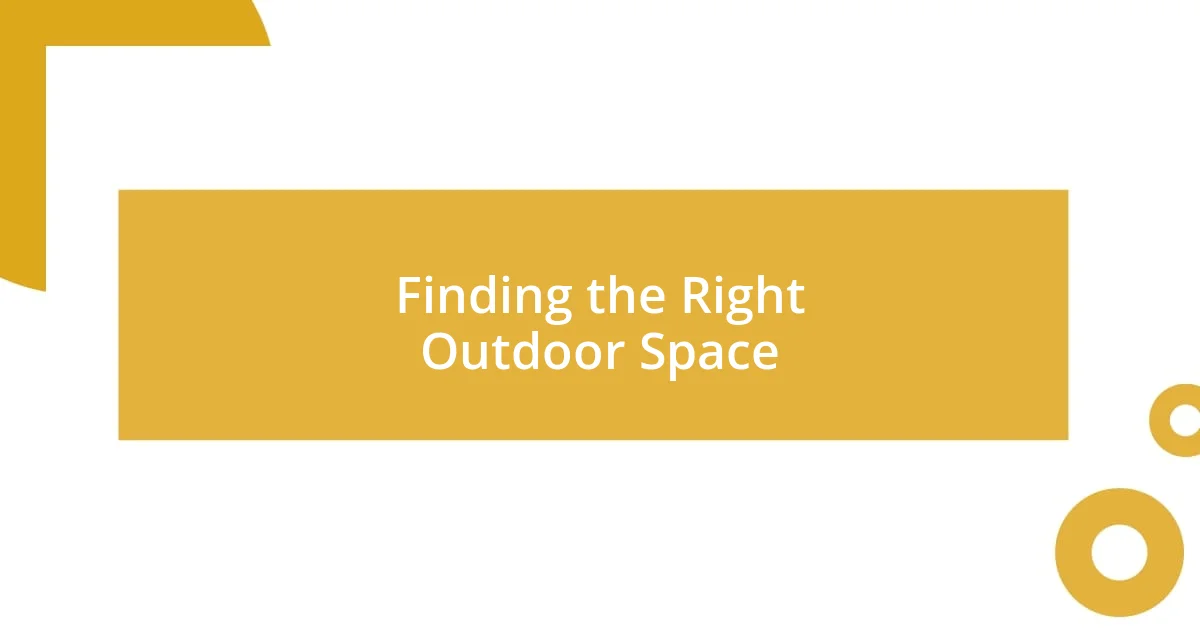
Finding the Right Outdoor Space
Finding the right outdoor space can transform the writing experience. I often seek out a secluded nook where I can be fully immersed in nature. On one particularly serene morning, I discovered a quiet bench perched near the edge of a forest. The smell of fresh pine and the soft rustle of leaves were energizing. It was as if that very spot was crafted for contemplation. Here are a few traits I look for:
- Seclusion: A place away from crowds allows for deeper focus and reflection.
- Natural Beauty: Vibrant scenery, like colorful flowers or rolling hills, can inspire and uplift creativity.
- Comfort: A comfortable spot, maybe with a cozy blanket or a cushion, makes for an inviting writing atmosphere.
Finding the perfect surroundings is as much about the experience as it is about the actual spot. One time, I ventured to a hidden glade that boasted a stunning view of a sunset painting the sky in hues of pink and orange. The breathtaking sights not only brought joy but also sparked ideas I didn’t know I had. When I write in such a space, the ambience encourages my thoughts to flow more freely. I encourage you to explore various outdoor spots until you find one that resonates with you.
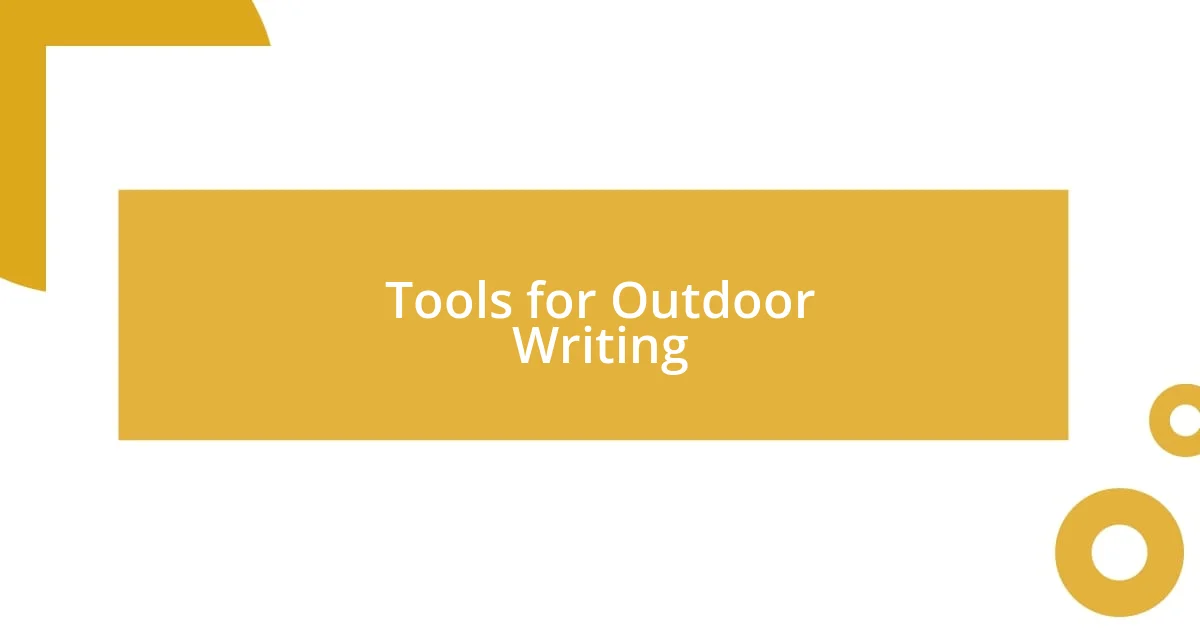
Tools for Outdoor Writing
When it comes to outdoor writing, the tools I choose can make all the difference. I’ve often found that a sturdy, portable writing pad is essential; something that can withstand a breeze or the occasional sprinkle of rain. I recall one crisp autumn day when I settled down on a rock, and the beautiful rustling leaves inspired just the right mood. Without my reliable notebook, that fleeting spark of creativity might have slipped away.
Digital devices also play a role in my outdoor writing toolkit. While typing on a laptop in a park might feel limiting, I enjoy using a tablet with a stylus for quick notes or sketches. Once, as I sat by a bubbling brook, I was able to capture not only thoughts but also a quick doodle of the scene before me. It’s amazing how blending technology with nature can elevate the writing experience—have you ever tried that?
Lastly, I can’t emphasize enough the importance of good writing instruments. Whether it’s a fountain pen that glides smoothly across the page or a simple mechanical pencil, the feel of the tool in my hand can spark creativity. I still remember a late afternoon spent writing with my old fountain pen, watching the ink flow freely as if mirroring the stream nearby. There’s something wonderfully meditative about the tactile experience of putting pen to paper in nature, don’t you think?
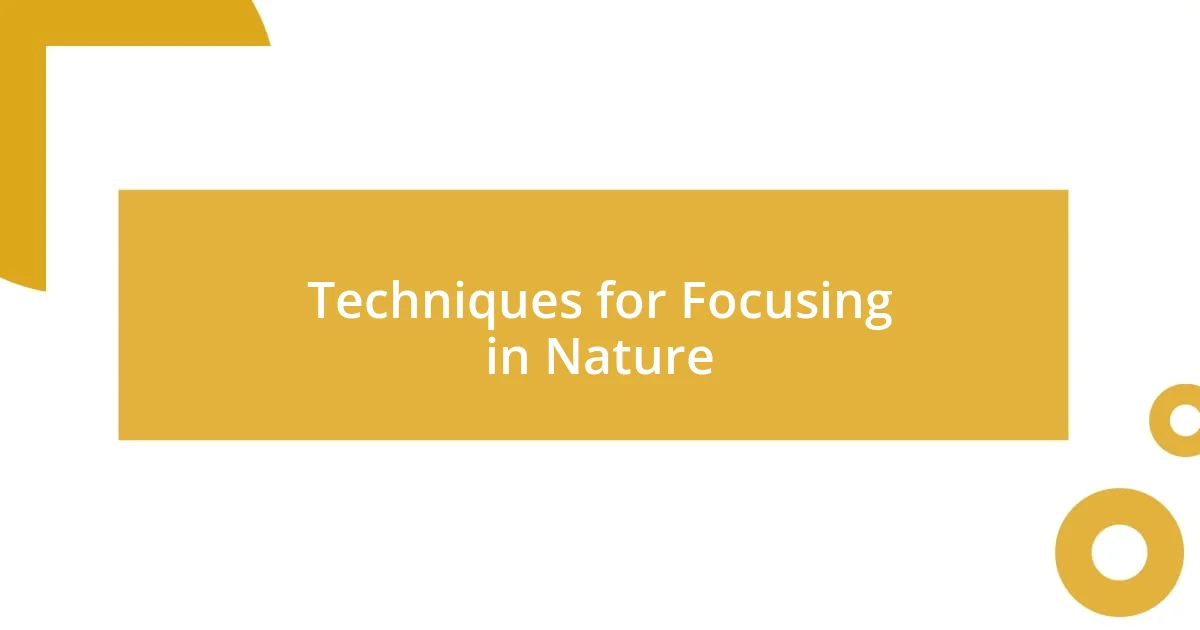
Techniques for Focusing in Nature
To hone in on my thoughts when writing in nature, I’ve found that engaging my senses is key. I like to close my eyes for a moment and simply listen. Each birdcall or the rustle of grass brings me deeper into my narrative. Have you ever noticed how certain sounds can trigger memories or ideas? One time, the distant laughter of children playing in a nearby field reminded me of my own childhood adventures, and suddenly, the words flowed effortlessly.
I also practice mindfulness to maintain focus. Taking a few deep breaths while consciously focusing on the scents around me—like damp earth or flowering trees—grounds my thoughts. I remember a tranquil afternoon spent breathing in the sweet aroma of blooming lilacs; it felt as though everything else faded away, leaving me just with my thoughts. This deliberate connection to the environment can almost feel like a partnership in the writing process, don’t you agree?
Additionally, I find that setting a small goal for my writing session helps me stay on track. Whether it’s drafting a page or jotting down a handful of ideas, it creates a sense of purposeful engagement. On one occasion, I challenged myself to write an entire scene based on a passing cloud’s shape—I was surprised at how that playful commitment unfurled a wealth of creativity. What simple challenges could you give yourself to spark inspiration while surrounded by nature?
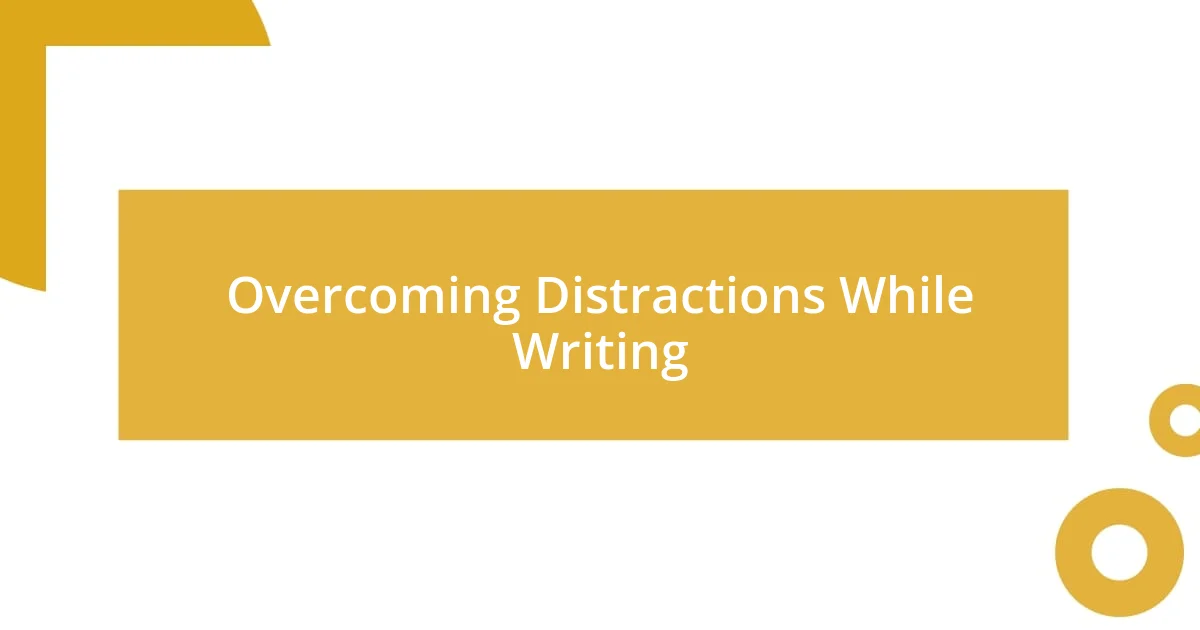
Overcoming Distractions While Writing
Distractions can easily creep in when I’m writing outdoors, so I’ve learned to embrace a few strategies. I remember a time when a particularly loud group of hikers passed by, and my train of thought derailed entirely. To combat this, I’ve started using noise-canceling headphones or simply tuning into the rhythm of nature around me. Have you ever noticed how the soft sound of rustling leaves can drown out more jarring noises? It’s all about shifting your focus.
Another technique I’ve found helpful is visually blocking out distractions. When I’m at a bustling location, I sometimes create a mental ‘bubble’ where I imagine everything around me fading into the background. During one writing session by the river, it felt as if I were in a world of my own, where only the words on the page mattered. This simple act of visualization can transform a chaotic environment into a sanctuary of creativity.
If the whispers of distraction persist, I turn to my surroundings for inspiration. There was a moment when a butterfly landed on my notebook, and instead of feeling interrupted, I let that serendipity guide my writing. Isn’t it fascinating how nature can shift our mindset? By allowing these small interruptions to inspire my thoughts rather than distract them, I can maintain a sense of flow that brings my writing to life. How do you respond to interruptions in your writing process?
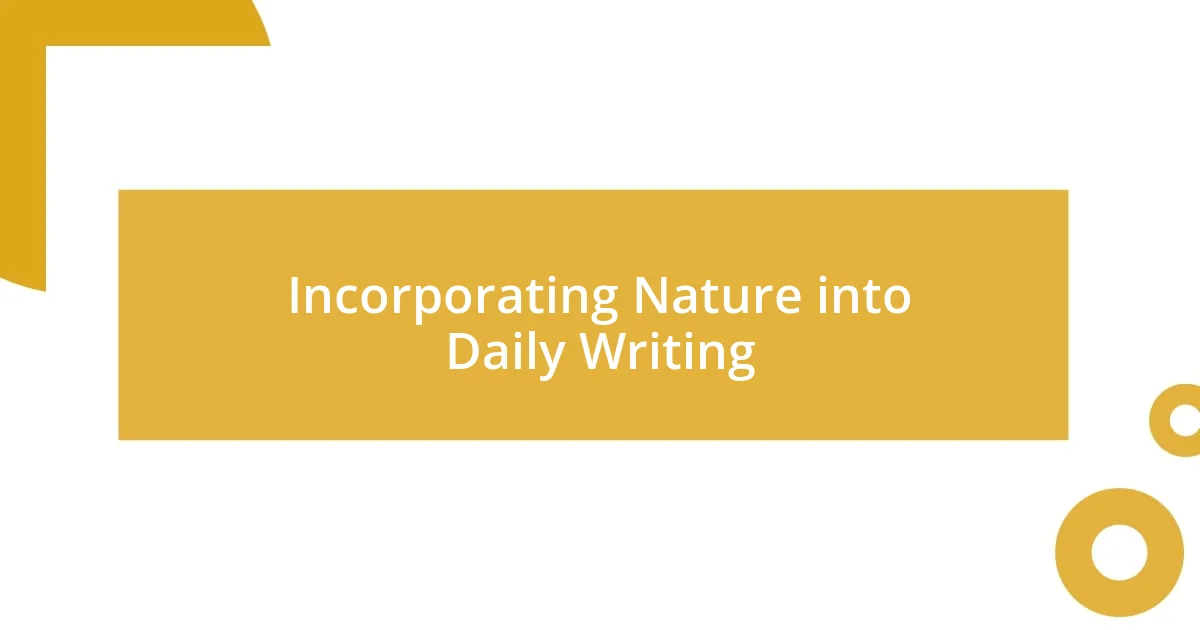
Incorporating Nature into Daily Writing
In my daily writing, I find that integrating nature isn’t just beneficial; it can be transformative. One morning, I took my journal to a quiet park, and as I wrote, the gentle sway of the trees caught my eye. That simple movement sparked an entire poem about change and growth—nature acted as the muse I never knew I needed. Isn’t it amazing how something as simple as observing a leaf dance can lead to profound creativity?
I also enjoy bringing elements of nature directly into my writing space, even if I’m indoors. Once, I collected a few stones and a small branch to place on my desk. Just having that natural presence around me turned my thoughts toward earthy themes. It’s incredible how objects from the outside world can anchor you in your writing, making your ideas feel more tangible. Have you tried surrounding yourself with nature-inspired items while writing?
Taking the time to step outside every day has become non-negotiable for me. I remember a particularly inspiring sunset that painted the sky in shades of orange and pink, and I felt compelled to capture that beauty on paper. Those colors and feelings not only enriched my writing but also reminded me of the splendor surrounding us. How often do we pause to really observe the world, and how might that affect our creative process?






